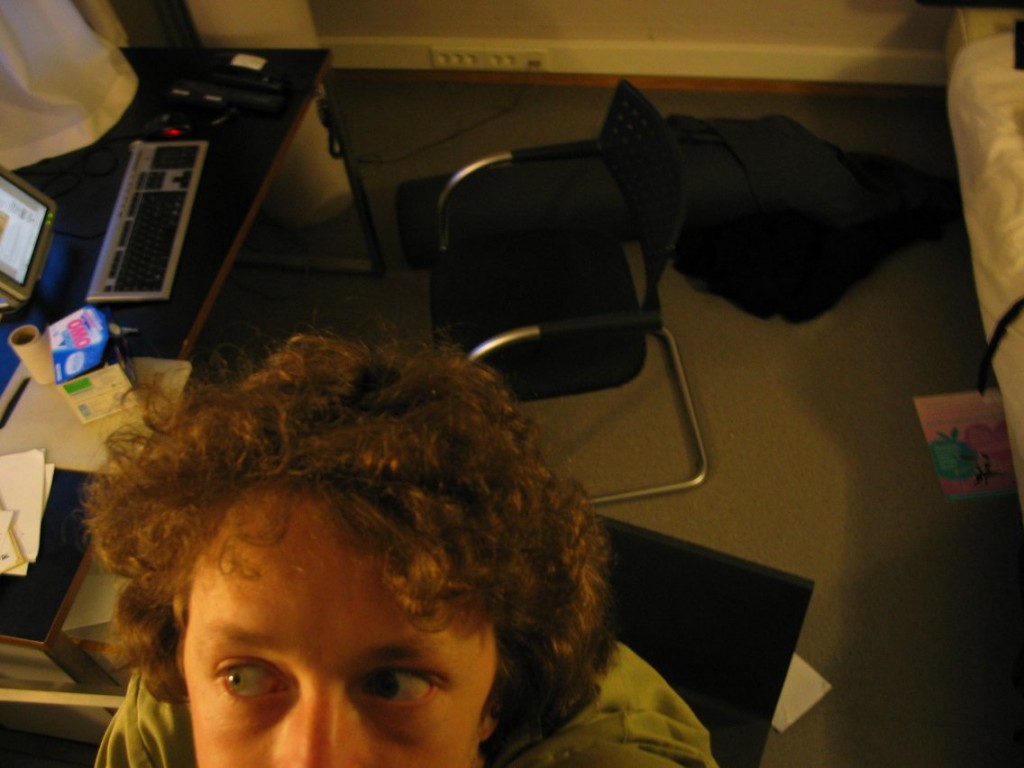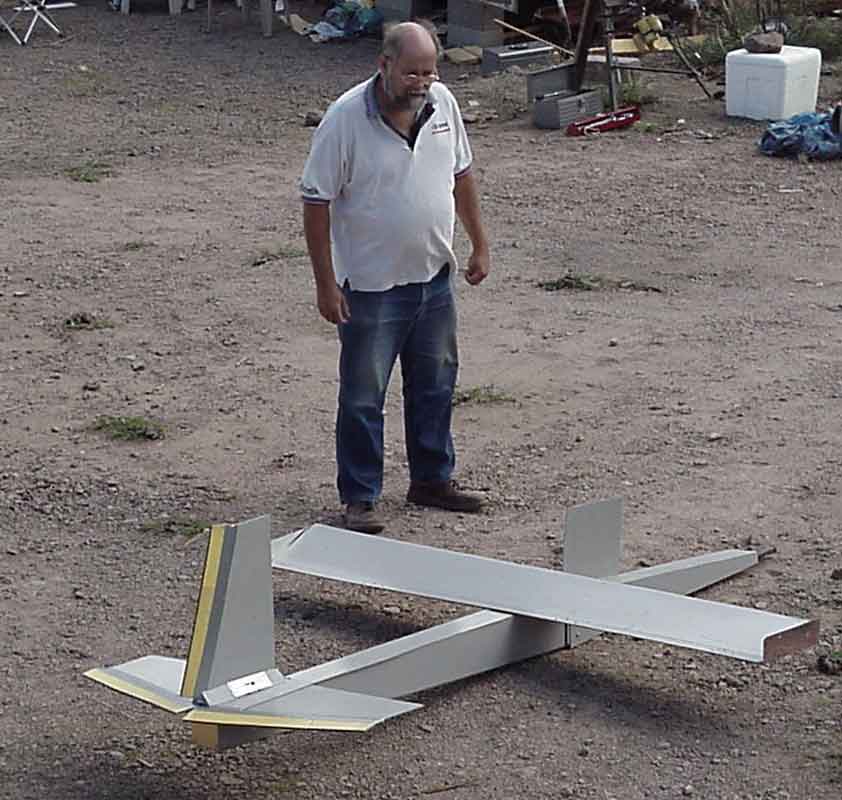that I can not greet royals in a more traditional way, I present the following picture I found when visiting my grandmother today:

I actually remember a few things from that day…
Continue reading To anyone who thinks…
that I can not greet royals in a more traditional way, I present the following picture I found when visiting my grandmother today:

I actually remember a few things from that day…
Continue reading To anyone who thinks…
So this is it, once again. Well, wait, I haven’t really been updating you for the past two and a half weeks. This is what has happened in the ever exciting life of Johannes Wilm:

During the weekend of the Revolutionary party (RV) national convention (for which I had programmed the system that allows for proposals to be tracked, ordered, printed out, handled by committees, etc.), one of my informants from Douglas, AZ showed up. ow he had announced his visit some weeks ago, but I really couldn’t believe that anyone from Douglas would really show up i Oslo just like that. I had known Jeff in Douglas during my first visit mostly as the boyfriend of January, but still I had had a few conversations with him back then, and especially since then both during my second visit and otherwise over MSN messenger and email have we had quite a few conversations. To give you kind of a idea how different we are, consider the following: he is 20 years old, he is a conservative, he is a christian, this was his first time leaving the Americas, he is a musician playing metal (?? actually I’m not sure what it is) ad he voted for George W. Bush at his reelection (although he now says that he can’t support him).Well, this guy suddenly showed up at the Oslo train station from where he called my cell phone. Now what was I to do? I concluded that shock therapy probably would be the most appropriate, so after picking him up, the first thing I did was to drag him through the national convention of RV (they had called me cause the Internet had stopped working), before we went to my room to drop of his stuff. A few hours earlier they had had a spokesperson from the Palestinian government (and member of Hamas) and he spoke in English, but unfortunately we were too late for that and what he got to see was really nothing more than a few old Norwegians speaking in Norwegian.
Continue reading The End?
That is the theme of the just published issue of Kontur Debatt that I spent most of last night to prepare — download it at kontur.tv.
In Norway, just like in Denmark there is one reformist socialist party and one revolutionary socialist party (in addition to the social democratic parties of course). While in Denmark the Red Green Alliance (Enhedslisten) has been sitting in the national parliament for many years, the Norwegian sister party does not seem to have been going anywhere for a long time. Partially this is simply due to different election laws, which favor small, urban parties in Denmark, while they do not in Norway. also the reformist socialist party in Denmark is quite a bit more hopeless than the Norwegian counterpart (for example, the Dansih Socialist People’s Party (SF) was FOR the very neo-liberal and pro-war EU constitution. But another part of it is the general direction the two revolutionary parties have: while the Danish party has left all references to the Soviet Union and Mao’s China, the quasi-Maoist fraction in the Norwegian sister party is still going strong.
Now the Norwegain revolutionary party will have its national convention this weekend, and many have been hopeful that the will be able to remove themselves entirely from the ideological left-overs of Stalinism. Unfortunately, rumors have it that the ex/quasi-Maoist fraction (AKP is officially organized as a party within the party) have managed ot accumulate at least 50 of the 120 delegates for the convention. In this issue of Kontur Debatt we will try to give to those party members who are not affiliated with AKP.
Antroplogi.info just published an interview in Norwegian, after earlier critisizing me for being “too engaged” in the way I conducted my study of Douglas, AZ. It seems that there were a few things I had to clarify: contrary to popular believe, I do in fact not believe that i hold the one and only key to the truth about what Douglasites should be doing, nor what goals they shoudl strive for. That does not mean that I do not have an opinion or that I believe that all options have equally much going for them. All it means is that I do not set myself apart from the “field” the way some intellectuals tend to do. But I believe the interview makes that pretty clear.
Right now I’m interested in the reactions the proclamation of “Marxist anthropology” as being a sort of study with the goal of undertstanding some local phenomenon better in order to be able to change things on a bigger scale will stir up. I know there are quite a few radicals studying anthropology here in Norway, but as far as I can get, most of those still follow the liberal model of anthropology (the one in which you are not allowed to say that A is better than B nor that you prefer A over B, but you have to tell about A, B and the totally outlandish alternatives C through Z). Let us see if we get a response from one of them.
Tomorrow morning at 9am the trial against us six activists who walked out onto a major inner Oslo road wearing Guantanamo costumes in connection with the visit of US Secretary of defense Donald Rumsfeld’s visit June 7th 2005. That day was the the 100th anniversary of Norway, and we happened to walk out onto Karl Johann’s Street just before the king drove by.
The reason why we were dressed up as Guantanamo prisoners was of course not to protest the king, but to protest the fact that the Norwegian government at the time welcomed invited a person such as Rumsfeld to celebrate the day here in Norway. Also, they had filled the Oslo harbor with war ships from all over the world (including a major hangarship the US) and had lined up soldiers on both sides of Karl Johann’s street the day when Norway celebrated 100 years of independence from Sweden — while the seccession bck then had been exceptionally peaceful.
<%image(20060503-militparade.jpg|379|284|A disturbance for the system? (picture: NRK))%>
What many people do not know is that several of us spent some of the other days on a similar street theatre as we had planned to do on the 7th as well.Up until then, everything had worked out fine. Now we’re facing a potential fine of 10,000NOK (ca 1600USD) + costs of the courtcase.
None of think we’re guilty, as we never really were a danger to the king. But this case is about so much more.The rather hefty fine is probably meant to deter others who might get similar ideas, and therefore I believe it is politically motivated.
See also:
http://www.aftenposten.no/nyheter/iriks/article1055066.ece¦ http://pub.tv2.no/nettavisen/innenriks/article403556.ece ¦ http://www.spisderike.net/artikkel/3088/
We were finally fined 9000kreach for the incident. See the Norwegian article in Klassekampen below
Sure you have! We all get graded all the time. Kindergarden, pre-school, middle school, high school, college, university, various certificates for having learned to swim, ride your bike or drive a car — grading has become one of societies great sports. More than that, especially in societies with a low degree criticism of the structure of society (and here I’m amongst others thinking of the country I currently reside in), it has become an entire ideology of itself: grading is seen as being a scientific activity done according to natural laws and any grade is dependent, and only dependent upon that which is being graded — subjective factors in grading do simply not exist. So if you get some grade from a school in some dinky place in northern Norway, that grade is directly comparable to another student might receive from a school in central Oslo. And more than that: according to this ideology, it is perfectly possible to accumulate grades across subject! So one can somehow say “student A with a certificate from a high school i central Oslo, who got A in math and B in French is a better student than this student B with a certificate from a high school in Tromsø, who got B in English and C in geography”. And people believe that is possible not only for high school, but also for college and university!
And once the grade has been handed out, one can then use it to objectively classify all students and either hand out salaries that correspond to the grades in case they take a job or in order to filter out the best if they choose to go on and take further studies.
Although I have always been highly critical of the first part, up until recently I had believed that at least the second part was one close to that way (although that does of course not make much sense given that the grade is not very objective to begin with).
But then I was called in to a meeting with the Central Admission Committee for bachelor studies of the University of Oslo in which I am one of two student representatives. The meeting was to decide upon the fate of a little more than 100 applicants for “selffinancing bachelor students”…
Continue reading Ever been graded?
My good friend and inventor Michael Fallwell is at it again. Previously he came up with a home-built revolutionary new telescope design, which is much cheaper than the existing designs because it leaves out all the unnecessary parts and the lenses can be grinded using parts of any old washing machine you can find on the road. Then he came up with a glider powered windmill that might soon make oil obsolete as there is much less electronical cruft involved compared with the static windmills as we know them today.

This time, Mike takes care of another of our current global problems: climate change. Mike’s rainenhancer works in the following way: you have a fleet of ships moving around the coast, pumping all the seawater they can up about 10m into the atmosphere (in 100m wides stripes around 200m apart). Then some of that water will get stuck there and form clouds which will then move up 100–1000km inland before they rain out — “like a little storm system,” as Mike says.
Just like most socialists, Mike believes that change in the structure of society is closely connected to changes in technology. But while most socialists in some way or another are politicians and believe the necessary technology to permit for a restructuralization are present already and all that needs to be done is to organize for a social revolution that will leave society with a different (socialist) structure which will be able to take full advantage of the inventions that have been made already.

Not so with Mike — as an inventor he sees the main driving force of human history to be the inventory spirit of mankind. If one wants changes, one needs to invent new ways of doing things — social changes will follow as reactions.
Unrealistic? Well, maybe. But how can we know if we don’t even try? I wish Mike all the luck he needs for getting it to work, but as a socialist I can’t quite see how society will change without any human intervention at all. But maybe technological inventionism is what people focus on if social change seem impossible to start with…
You might remember my previous item on the matter, and our protest from the Left Alliance against Millinkevich, the pro-Western, pro-privatization candidate in Belarus. Last weekend, Millinkevich came to Oslo as a guest of the Norwegian Helsingfors Commitee. As noone else had, we ended up being the ones protesting him. And by the way, yesterday, I gave up all my positions in the Left Alliance. I decided upon that mainly for three reasons:
1. the youth has to take over (although several of them are older than me or have been in student politics for a longer time)
2. the student parliament is mainly limited towards having the powers of a student council at a high school. Now although it was pretty soon clear to me that those were it’s formal powers, it took quite a long time for me to udneerstand that most other MPs also wanted it to remain that way and that they enjoyed having phony debates about things they couldn’t do anything about — without even getting the press involved to build up public pressure
3. I might, believe it or not, actually finish my career as a student this summer!
…well and then there are more interesting things/activities out there. So don’t expect me to stop being active quite yet!
Update (04/30/06): The last session of the student parliament this year was actually on Thursday after I had written the entry, so technically speaking, I had one last meeting to attend to. And at that meeting, the student parliament called for a boycott of all the main occupation states: Israel, USA, China, Marocco, Turkey, Russia, Iraq, Iran, Great Britain, Pakistan, India and Indonesia. I really don’t think it can get very much more radical… If you know Norwegian, you can read the entire text below.
Continue reading Millinkevich once more
Niels S.Nielsen from Århus today had the following review of On the Margins in the Danish minority in Germany newspaper Flensborg Avis (they take stuff offline for a month after the day of publication, so I’ll paste it all here). It’s written in Danish:
Folk i en grænseby
Duborg-studenten Johannes Wilm (årgang 2000) er nok for mange Flensborg Avis-læsere kendt for sine tildels kraftige udbrud mod det danske mindretals institutioner i form af læserbreve sendt fra hans nyvalgte hjemsted Oslo. Man kunne derfor tro, at han ikke har meget tilovers for grænseområder og de deraf følgende problemer. Det er derfor overraskende at læse Wilms bog “On the Margins – US Americans in a Border Town to Mexico” om grænsebyen Douglas på grænsen mellem USA og Mexico. Han forsvarer her de overvejende mexicanske indbyggere, som i det meste af USA kun er kendt for at smugle narkotika og mennesker over grænsen. Socialisten Wilm forklarer, at byen, han har boet i i lidt over et halvt år, har en reel ledighed på over 50 procent, og at der for mange af de unge ikke er mange andre udveje end enten at smugle eller forsøge at få job som grænsevagt.
Wilm har i sin tid i Douglas fulgt en mængde forskellige personer – fra elever på gymnasiet i Douglas, som han prøver at overbevise om, at de ikke skal melde sig ind i den amerikanske hær for ikke at blive sendt til Irak, til de mænd i halvtredserne, som har siddet i fængsel for bl.a. smugling af store mængder narkotika – som han prøver at hjælpe til at komme til penge. Når Wilm prøvede på at overbevise dem alle om, at der findes andre muligheder for dem, var han nok lidt for missionerende og for lidt forsker. Men billedet, han tegner af befolkningen, er dog interessant. Det er de udstødte, man ikke hører noget om. Det er dem, som ikke klarer sig i det amerikanske konkurrencesamfund.
Når Wilm kommer ind på temaet nationalisme, er det klart, at han har baggrund i det danske mindretal i Sydslesvig. Kritisk prøver han at belyse, hvordan hver enkelt opfatter sig selv, når det gælder nationalitet og tilhørsforhold. Mange af hans teser er da også interessante: Det er ofte de hvide angelsaksere med familiebaggrund fra et andet sted i USA, som er mindst interesseret i at bevare de amerikanske traditioner, mens nogle af de ivrigste og mest konservative nationalister findes blandt andengenerationsindvandrerne fra Mexico.
Om man politisk er enig med Wilm eller ej, er hans tema interessant, fordi der skønsmæssigt bor 11 millioner “illegale” indvandrere i USA for tiden, og fordi der i disse dage protesteres i store dele af USA både af dem, som vil smide indvandrerne ud, og af dem, som vil give dem opholdstilladelse. Man må håbe, at Wilms bog kan øge forståelsen for mennesker, som bor i disse marginaliserede samfund.
Yesterday I got a surprise visitor who came by to invite me to walk another couple of streets of Oslo that I had not seen before. Yes, you guessed it, it was the French walker who visits me every now and then. He is the type who does not like walking streets with bars and so we usually walk through residential areas instead. Those are not very hard to find in this city though. And with everyone gone and the streets not yet cleaned since the snow melted, much of Oslo certainly looked the closest to what I’d imagine the abandoned areas around Chernobyl t look like. One could stand right in the center of an intersection with 5-6 floor houses on all four corners and extending quite a bit in either direction. And there would be no-one. No cars, no person, no sound, no nothing. Amazing, quite amazing. My co-walker immediately commented on it as if it were some common trait of all Norwegians: “They don’t ever talk to anyone. They talk to their parents and their siblings and their boyfriend or girlfriend. But that’s it. You almost need to have known oneanother since kindergarden if you are to talk with oneanother.” He also commented on this blog (which he seems to be reading extensively): “You know the stuff you write is like a 16 year old girl. You write on where you go and what you think about this and that,” he criticized. “So what should I write then?” I inquired, “should I just write like these hard core political blogs that people like [ANONYMIZED] have? What’s the point with that? I can read the newspaper if I want the news, or I’ll post something on a news site if I now something new [in addition I’m discussing politics on various email lists]. You know, I’m trying to use the blog to try to give a ‘human face’ to the hard-core politicized Johannes who people tend to ‘know’ me as being. “But the things you’re writing, about what you feel and what you think about and so on; Norwegians would never write anything like that,” he continued, “they’ll think ‘what’s wrong with you?’ and ‘Is he lonely or something?'”
ow to a certain degree he is of course right. This is not a very Norwegian styled blog. Most Norwegians wouldn’t write this kind of stuff. But the fact that I choose to do anyways is not that I do somehow not feel such standards or that I do not think it is weird to expose myself in this way — rather it is that I feel I have a mission to _change_ the way people think about these things. If we ever are going to establish a society with less privately controlled property and more held in the common (and Norwegian society anno 2006 is extremely focused on the private: even food at common meals are usually held in the private), we also need to be able to break down some of the unnecessary boundaries as what one can talk about publically and what one ca not. Of course, there will and should always be social boundaries on some level, but the concrete manifestation of these are much less ‘hard-coded’ into any culture than people tend to think, I am strongly convinced of. Just looking at the way the older student houses are built and how they must have been used with common showers and kitchen for up to 8 students — unthinkable to live in for many young Norwegians nowadays.
So if you are one of those Norwegians wondering what the purpose of this blog is: view it a cultural experiment. View it as a way of trying to change the culture i am myself a part of.
However, the fact that this blog is so infrequently updated is exactly that I do usually not have much spare time at all… so I guess that goes somewhat against the earlier mentioned theory of Norwegian generally being isolated. Oh well. How do you like the new header picture by the way? Also check the footer (there are only two of them though) I finally got the HTML/CSS fixed so that it shows correctly in IE, Firefox and Konqueror. Or it least it has done on all the browsers I’ve checked so far… please report any problems you might find.